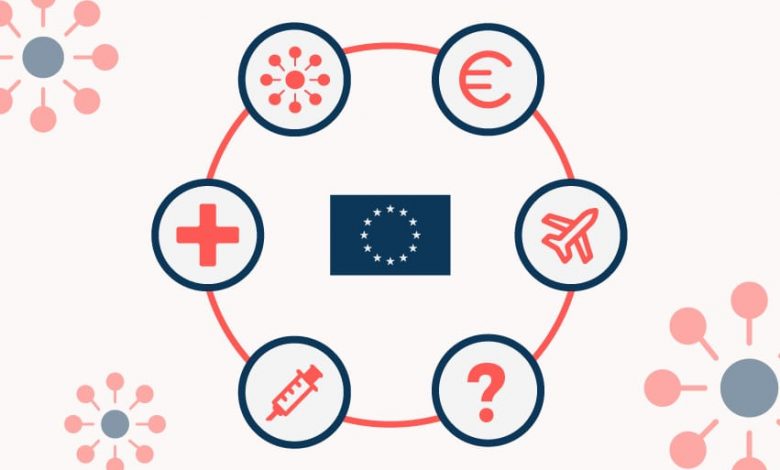Covid-19 Ad The New Disease And EU’s Prevention Policies

In this article, we will examine the danger of COVID-19, the order and irregularities brought by this danger, and the European Union’s attitudes and behaviors, also which countries affected mostly in the European Continent.
After the Spanish Influenza in 1918-1920, our world witnessed the biggest pandemic which had spread very fast, named COVID-19. In 1918, after the First World War, the disease had spread, but what they didn’t know the disease had existed due to virus. The global disasters trigger the debates on the shifting of social structure. Questions were asked such as; will global system and structure gonna change radically? What is the next stage of the world? To answer these questions we should be able to understand which factors cause these global disasters. If we would look back to the 20th century, in 1918, “Spanish flu” caused deaths of 50 million people. In this case states must be prepared for any disaster. There is a debate about the future of global structure after a disaster, one side argues that the system will be stay same as what it was, other side argues that the global system will never be same as usual.
COVID-19 began to spread from China and spread very quickly all over the world. On December 31 2019, it was learned that the virus had begun to spread with the news received from the Wuhan Municipal Health Commission in Wuhan city. On 20 January 2020, world learned that the virus has already spread the surrounding countries, which are Japan, Thailand, and South Korea. After 3 days, Wuhan city locked to travel in and out but it was too late for such measures, virus arrived in France on the 24th of January. After that we witnessed that the whole world including European Continent surrounded by a deadly virus.
The current world order is a multipolar system based on the superiority of the USA. However, it is being discussed that China will replace the USA after the virus. But the question of what will happen to Europe as a result of all this also remains in mind.
The COVID-19 outbreak has the potential to lead to a transformation in many areas, the effects of which can be felt for many years. International relations experts have already started to create literature on this subject.
The first question that comes to mind when considering the effects of COVID-19 is whether it can replace the liberal world order established after the Cold War and which is said to be in decline in recent years.
How European Countries Affected By The Virus
Italy was the first country that reached more cases than China on March 12. First, entry and exit to some towns and cities were banned, then the northern regions of Italy were quarantined, sports events were postponed to an unspecified date, and most recently, quarantine measures were taken in the whole country. But despite all this prevention, deaths in Italy have increased rapidly.
The number of cases, which was very low on the 1st of March in France, increased 20 times after 10 days. Some lawmakers and ministers were announced to have been infected by the coronavirus. On March 12, all schools in the country were closed, museums were closed, and sports competitions were postponed.
Spain ended flights to Italy in order not to be harmed as it was a Mediterranean neighbor of Italy, but 375 people met in Madrid on March 8, International Women’s Day, and this posed a great threat. Madrid, the capital, was the city where the virus spread most in Spain. In some areas, schools were closed, after which sports competitions and domestic trips were stopped. Spain was the country with the highest number of cases in Europe after Italy.
Germany also became one of the affected countries of Europe, but the death rate in Germany was very low compared to others. The test laboratory, one of the measures taken by Germany, played a big role in preventing the disease. Currently, the number of confirmed cases worldwide is 3 million after coronavirus, the number of patients recovering is 875 thousand and the number of deaths is 207 thousand.
As the Coronavirus Affected European Continent and World, How Could The European Union Will Be Affected By This?
First of all, it is necessary to review the policies of the European Union since its establishment. The European Union was formed with the integration of 6 states for the purpose of economic integration after World War II, these 6 states are Belgium, Federal Germany, France, Italy, Luxembourg and the Netherlands. Its main purpose was to provide an environment of peace within the continent after the war and to follow new paths for economic development. 6 members later formed the European Economic Community (EEC) with the Treaty of Rome. Among these countries, customs duties have been completely abolished and a major integration step has been taken in trade.
The European Union delegates its rights to restrict some of the actions of the countries, thereby strengthening the environment of peace. Starting with 6 members, the European Union has reached 28 members today. The European Union’s only organ that comes through elections is the European Parliament, the parliament also has legislative powers. How many people will represent the country in the parliament? It depends on the country’s population.
With the participation of Denmark, Ireland, and England in 1973, the number of European Economic Community members increased to 9 in total. In the process following these contributions, Greece joined the community in 1981, Spain and Portugal in 1986. With the 1992 Maastricht Treaty, the Community was strengthened, thus the European Union has established. In the 1990s, 15 more countries (Austria, Finland, Sweden, Romania, Poland, Hungary, Czech Republic, Bulgaria, Slovakia, Estonia, Latvia, Lithuania, Slovenia, Cyprus and Malta) joined the European Union. Lastly, on June 1, 2013, Croatia became the 28th member of the European Union. These developments followed the Brexit process that started in 2017 and Britain left the EU.
The European Union made a common decision in the sale of medical supplies across closed borders in order to prevent member states from suffering medical and financial difficulties. European Commission is coordinating a response to the Coronavirus, at the same time, the European Central Bank provided over 750 billion Euros for debt purchases on behalf of the member states. Thus, the financial situation of the member states, big firms, and workers who could not receive their payments was taken under control. This attitude of the European Union is a very important step to avoid financial difficulties in the future. The Commission also offered 100 billion Euros for employment to member states, with this step, they tried to prevent risk of unemployment. We can not say that Europe will suffer financial collapse as a result of the pandemic, because the steps taken and the measures taken show that it can restore everything when the virus ends.
The EU’s president Ursula von der Leyen has established a response team to coordinate combat to the pandemic. Ursula Von der Leyen mentioned on her speech that to get rid of the crisis, they have developed three different strategies, she also stated that they are trying to prevent chaos which is a result of the disease. The most important thing that she had spoken about is the protection of old citizens which are fragile against the Coronavirus.
As a Result of The Pandemic:
European Union had took action against the COVID-19 disease earlier, has already developed the financial system which will be protect the individuals and institutions after the crisis. It is not known exactly how the order after the virus will be, it is best to make predictions and take precautions about what will happen from different perspectives and sources.
A major threat like coronavirus has gathered European countries, they must work together to overcome such crisis. We witnessed that Europe is designing tremendous financial support, which is one of the most important measures taken to prevent the virus.
We can assume that the COVID-19 pandemic will gain nature that will cause paradigm shifts such as the September 11 Attacks and the 2008/2009 Global Financial Crisis and accelerate international system inquiries rather than systemic breakthroughs such as the First and Second World Wars the end of the Cold War.



